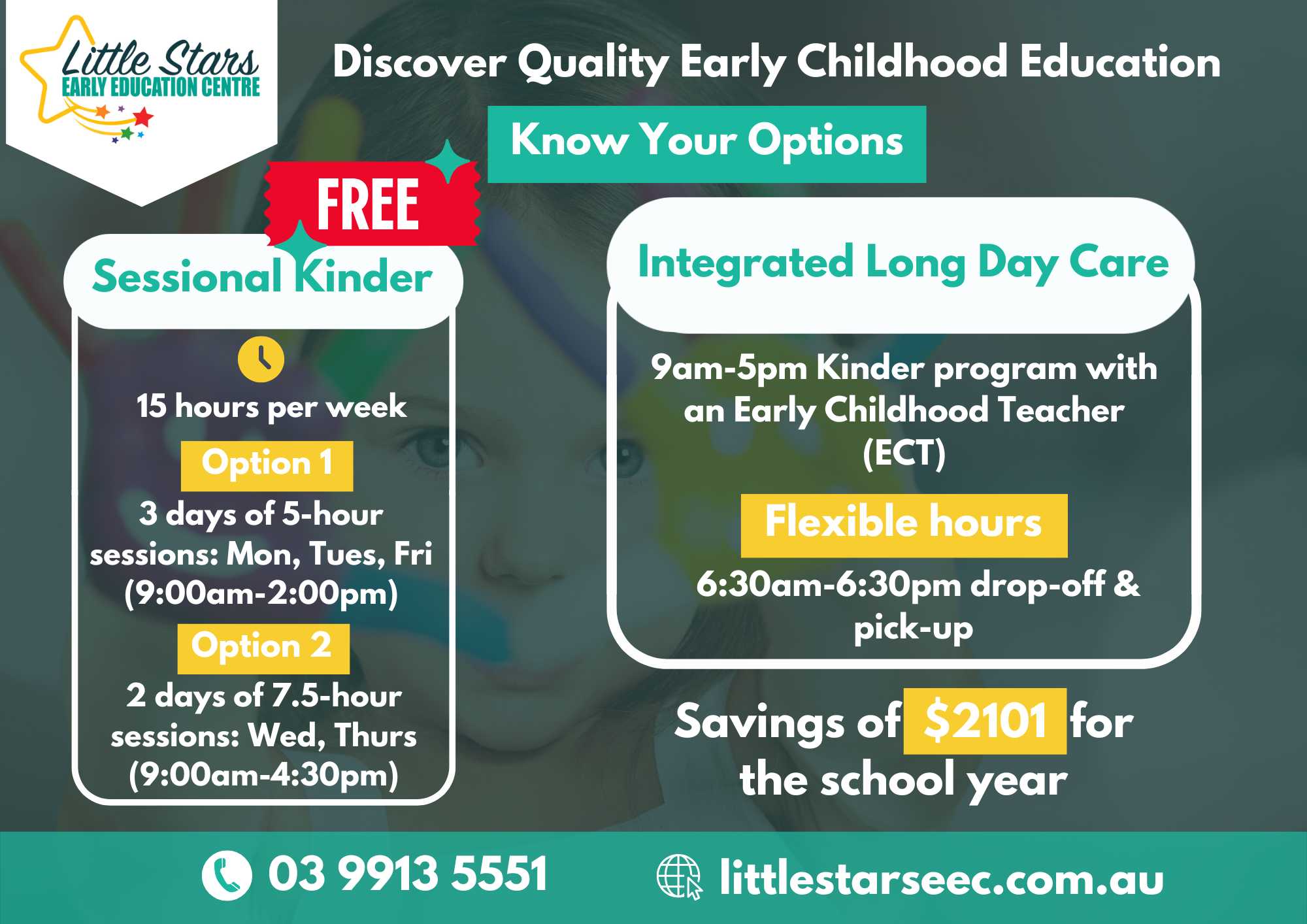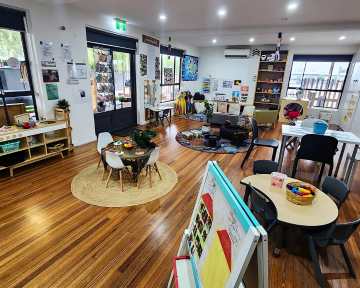Early childhood education is a pivotal stage in a child’s development, laying the foundation for future learning and growth. Choosing the right program for your child can significantly impact their early experiences and prepare them for the next stages of education. In this article, we explore two key options: sessional kindergarten and integrated kinder programs. Both offer unique benefits and cater to different family needs, making it essential to understand their features to make an informed choice. Sessional kindergarten refers to a structured early childhood education program that typically operates for a set number of hours each week. In most cases, sessional kindergarten offers around 15 hours of play-based learning, divided into specific sessions. These sessions usually run for three days a week, with each session lasting around five hours depending upon centre’s policy. This format provides a consistent routine for children, helping them adjust to a school-like environment. Sessional kindergarten emphasizes play-based learning, which is crucial for young children’s cognitive, social, and emotional development. This approach encourages exploration, creativity, and problem-solving through guided play. The program also provides ample opportunities for socialization, allowing children to interact with their peers, make friends, and develop essential communication skills. The structured environment of sessional kindergarten helps children get accustomed to following a routine, participating in group activities, and transitioning between different tasks. Sessional kindergarten is ideal for families who prefer a shorter, structured program. It suits parents or caregivers with flexible work schedules who can manage the specific drop-off and pick-up times. It is also an excellent option for children who are preparing for the transition to primary school, as it provides a gentle introduction to the school environment while allowing plenty of time for play and exploration. Integrated kinder, also known as integrated kindergarten, combines early childhood education with long day care services. This model offers a seamless blend of education and care, providing extended hours that cater to the needs of working parents. An integrated kinder program typically runs from 9 am to 5 pm, with additional care available from 6:30 am to 6:30 pm depending on centre’s policies. This structure allows children to stay in a consistent environment throughout the day, benefiting from continuous interaction with educators and peers. One of the primary advantages of integrated kinder is its flexibility. The extended hours accommodate the schedules of working parents, offering a reliable and convenient childcare solution. Integrated kinder programs provide a comprehensive early learning experience, with a curriculum that includes structured activities, free play, and rest periods. This continuity of care helps children feel secure and comfortable, promoting emotional well-being and a sense of belonging. Additionally, the program supports a smooth transition from home to a school-like setting, preparing children for future academic and social challenges. Integrated kinder is particularly beneficial for families needing full-day care. It is an ideal choice for working parents who require a consistent and extended childcare solution. The program also suits children who thrive in a stable environment with a well-rounded daily routine. The additional hours provide more opportunities for learning and development, allowing children to engage in various activities that enhance their skills and knowledge. The primary difference between sessional kindergarten and integrated kinder lies in their schedules. Sessional kindergarten offers a limited number of hours each week, typically spread over three days. In contrast, integrated kinder provides extended hours, accommodating the needs of working families. This distinction significantly affects the level of flexibility and convenience each program offers. Both sessional kindergarten and integrated kinder programs emphasize play-based learning. However, the extended hours in integrated kinder allow for a more comprehensive curriculum that includes a broader range of activities. This can include more time for individualized attention, small group work, and additional enrichment opportunities. Integrated kinder offers greater flexibility in terms of drop-off and pick-up times, making it a practical option for parents with demanding work schedules. In contrast, sessional kindergarten has fixed session times, which may be less accommodating for some families. The availability of these programs can also vary, with integrated kinder often being available in larger centers and sessional kindergarten offered in more community-based settings. When choosing between sessional kindergarten and integrated kinder, it’s essential to consider your child’s individual needs. Think about your child’s temperament, social readiness, and learning style. For instance, some children may thrive in a shorter, more structured environment, while others may benefit from the extended hours and diverse activities offered in integrated kinder. Your family’s circumstances, including work schedules and childcare needs, play a significant role in deciding which program is best. Integrated kinder provides a full-day care solution, ideal for working parents who need a reliable and consistent arrangement. On the other hand, sessional kindergarten may suit families with more flexibility or those who prefer a shorter, focused educational experience for their children. Before making a decision, visit potential centres and meet with educators. Observe the facilities, ask about daily routines, and inquire about the curriculum and care policies. Understanding the program’s approach to early childhood education and how they support children’s development can help you make an informed choice. Choosing between sessional kindergarten and integrated kinder programs depends on your child’s unique needs and your family’s circumstances. Both options offer valuable early learning experiences that lay the groundwork for future success. By carefully considering your options and understanding the benefits of each program, you can find the best fit for your child and ensure they have a positive and enriching early childhood education experience. Our Sessional Kinder program is a fantastic, cost-free option that offers 15 hours of play-based learning per week. We have two flexible options to accommodate your family’s schedule: This program focuses on fostering social, emotional, and cognitive development through a structured routine and engaging activities. Our experienced educators create a warm and welcoming environment where children can explore, learn, and grow. For families needing a more comprehensive and flexible childcare solution, our Integrated Long Day Care program offers an extended Kinder program led by an Early Childhood Teacher (ECT). The program runs from 9 am to 5 pm, providing a rich blend of educational activities and care. Our Integrated Long Day Care program ensures that children receive consistent, high-quality education and care throughout the day. This program supports children’s overall development, providing them with the skills and confidence they need for future learning. If you are looking for a Kindergarten in Avondale Heights, we invite you to join the Little Stars family and give your child the gift of quality early education. Whether you choose our Sessional Kinder or Integrated Long Day Care program, you can rest assured that your child will be in a supportive and enriching environment. For more information or to schedule a tour of our centre, please contact us today. We look forward to welcoming you and your child to Little Stars Early Education Centre!
Introduction
What is Sessional Kindergarten?
Definition and Overview
Benefits of Sessional Kindergarten
Who is Sessional Kindergarten Best Suited For?
What is Integrated Kinder?
Definition and Overview
Benefits of Integrated Kinder
Who is Integrated Kinder Best Suited For?
Key Differences Between Sessional Kindergarten and Integrated Kinder
Schedule and Duration
Educational Approach and Curriculum
Flexibility and Accessibility
How to Choose the Right Program for Your Child
Assessing Your Child’s Needs
Considering Family Circumstances
Visiting and Researching Centres
Conclusion












